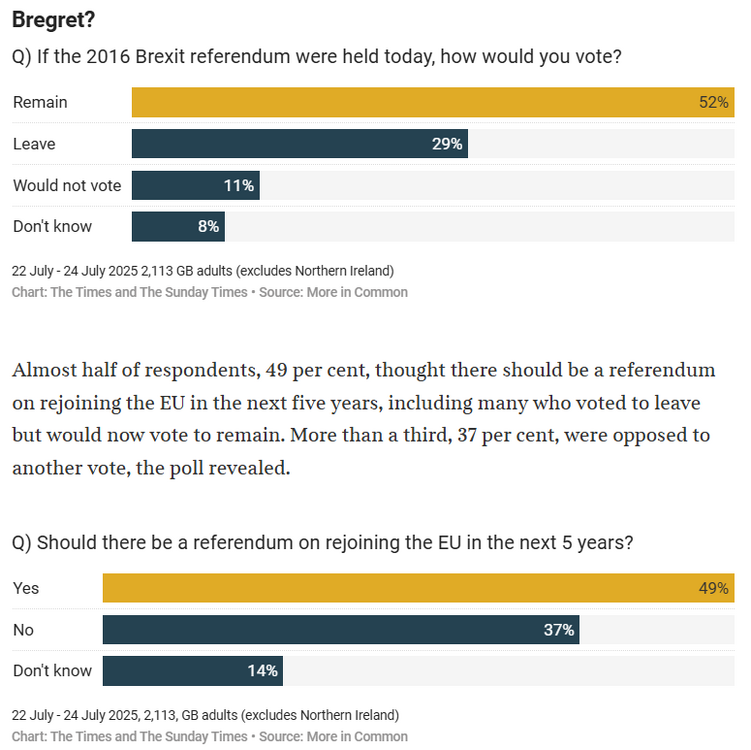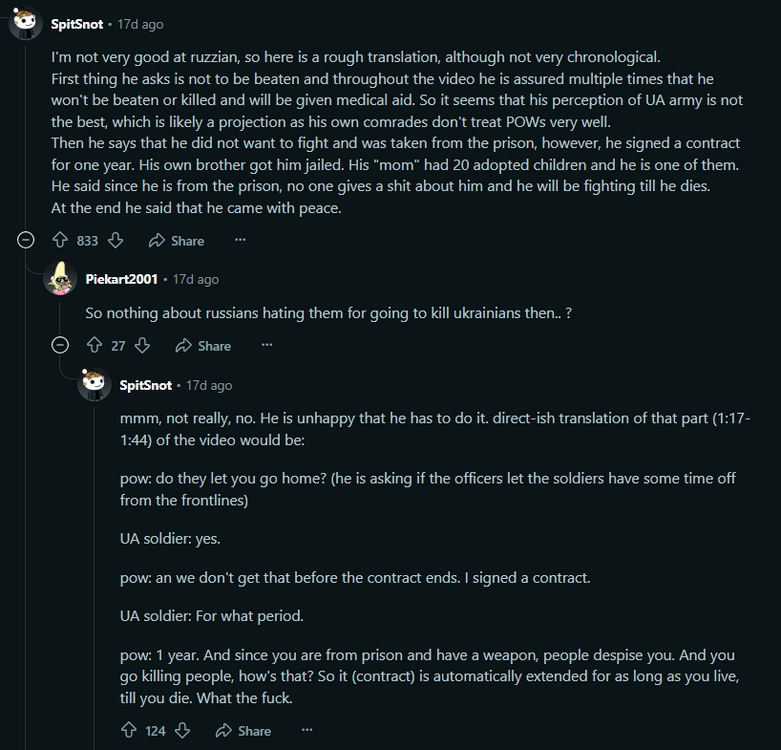
Everything posted by bolverk
-
Child Torture and SA Ring - Alabama
From the article: The charges include human trafficking, rape, sodomy and sexual torture, Sheriff Wade said. Two women and five men were charged. A full list of the suspects’ names was not available. “I’m afraid there’s going to be more victims and many more suspects,” he said.
-
Wordle [spoilers inevitable but discouraged]
Wordle 1,509 3/6 ⬛⬛🟨⬛⬛ ⬛🟨🟨🟨🟨 🟩🟩🟩🟩🟩 Connections Puzzle #787 🟨🟨🟨🟨 🟩🟩🟩🟦 🟩🟩🟩🟩 🟦🟦🟦🟦 🟪🟪🟪🟪 🙂 Daily Quordle 1290 7️⃣4️⃣ 6️⃣5️⃣ m-w.com/games/quordle/ 🟨⬜⬜🟨🟨 ⬜🟨🟩⬜🟨 ⬜⬜⬜⬜⬜ ⬜⬜⬜⬜⬜ ⬜⬜⬜⬜🟩 ⬜⬜⬜🟨⬜ ⬜⬜⬜🟨⬜ 🟩🟩🟩🟩🟩 ⬜⬜⬜⬜🟩 ⬛⬛⬛⬛⬛ ⬜⬜⬜⬜⬜ ⬛⬛⬛⬛⬛ 🟩🟩🟩🟩🟩 ⬛⬛⬛⬛⬛ ⬜⬜🟨⬜⬜ ⬜⬜🟨⬜⬜ ⬜⬜⬜🟩⬜ ⬜⬜⬜🟨⬜ ⬜🟨⬜⬜⬜ 🟨⬜⬜⬜🟩 🟨⬜🟨⬜⬜ 🟨⬜⬜⬜⬜ ⬜🟩🟨⬜⬜ 🟩🟩🟩🟩🟩 🟩🟩🟩🟩🟩 ⬛⬛⬛⬛⬛
-
corporation for public broadcasting shutting down
Here's a handy guide to the loss of funding for public TV and radio stations in Texas. The drop-down menu shows other states, plus there's a random station generator thing at the bottom showing the most drastic cuts. It looks like stations in the bigger markets are losing about 5-10%, while the smaller ones are losing up to a third or more. The public TV stations look to be the worst affected. For example, the PBS station in Midland has a 46% loss in funding. https://adoptastation.org/texas
-
Post a pic that makes you say "Holy shit."
Cloudburst that caused flash flooding. https://www.bbc.com/news/articles/c78zjd8xj2xo
-
Non-political tariffs thread
-
Wordle [spoilers inevitable but discouraged]
Wordle 1,508 4/6 🟩⬛⬛🟨⬛ 🟩⬛🟩⬛🟨 🟩🟩🟩🟩⬛ 🟩🟩🟩🟩🟩 Connections Puzzle #786 🟩🟩🟩🟩 🟨🟨🟨🟨 🟦🟦🟦🟦 🟪🟪🟪🟪 🙂 Daily Quordle 1289 4️⃣5️⃣ 6️⃣8️⃣ m-w.com/games/quordle/ 🟨🟨🟩⬜🟨 🟩⬜⬜🟨⬜ ⬜⬜🟨⬜⬜ 🟨🟩⬜⬜⬜ ⬜⬜⬜⬜⬜ ⬜⬜⬜⬜⬜ 🟩🟩🟩🟩🟩 ⬜⬜⬜🟨⬜ ⬛⬛⬛⬛⬛ 🟩🟩🟩🟩🟩 ⬜🟨🟨🟩⬜ ⬜⬜⬜🟨⬜ ⬜⬜⬜⬜⬜ ⬜🟨⬜⬜⬜ 🟨🟩⬜⬜⬜ ⬜⬜⬜⬜🟩 ⬜⬜🟨⬜🟩 ⬜⬜⬜⬜⬜ ⬜⬜🟨⬜⬜ ⬜🟨🟨⬜⬜ 🟩🟩🟩🟩🟩 ⬜⬜⬜🟨⬜ ⬛⬛⬛⬛⬛ ⬜🟩🟩🟩🟩 ⬛⬛⬛⬛⬛ 🟩🟩🟩🟩🟩
-
Israel vs everyone war thread
It appears that @Hitch, the bitch, has run away.
-
Israel vs everyone war thread
In their own words: David Ben-Gurion, Israel's first Prime Minister (1948-1953, 1955-1963): "We must expel Arabs and take their places...and, if we have to use force... then we have force at our disposal." (from Nur Masalha, Expulsion of the Palestinians, p. 66) "The compulsory transfer of the [Palestinians] from the valleys of the proposed Jewish state could give us something which we never had, even when we stood on our own during the days of the first and second Temples. We are given an opportunity which we never dared to dream of in our wildest imaginings." (from Benny Morris, Righteous Victims, p. 142) "In many parts of the country new settlement will not be possible without transferring the [Palestinian peasants]... Jewish power, which grows steadily, will also increase our possibilities to carry out the transfer on a large scale." (from Righteous Victims, p. 143) "With compulsory transfer we [would] have a vast area [for settlement]. I support compulsory transfer. I don't see anything immoral in it." (from Righteous Victims, p. 144) "After the formation of a large army in the wake of the establishment of the [Jewish] state, we shall abolish partition and expand to the whole of the Palestine" (from The Birth of Israel: Myths and Realities, p. 22) Chaim Weizmann, Israel's first President (1949-1952): "[the indigenous Palestinian population was akin to] the rocks of Judea, as obstacles that had to be cleared on a difficult path." (from Expulsion of the Palestinians, p. 17) Moshe Sharett, Israel's second Prime Minister (1953-1955): "We have forgotten that we have not come to an empty land to inherit it, but we have come to conquer a country from people inhabiting it" (from Righteous Victims, p. 91) On the partition of Palestine into two states: "The [Palestinian] Arab reaction would be negative because they would lose everything and gain almost nothing ...They would lose the richest part of Palestine; they would lose major Arab assets, the orange plantations, the commercial and industrial centers and the most important sources of revenue for their government which would become impoverished; they would lose most of the coastal area, which would also be a loss to the hinterland Arab states...It would mean that they would be driven back to the desert." (from Expulsion of the Palestinians, p.59) "With regard to the refugees, we are determined to be adamant while the war lasts. Once the return tide starts, it will be impossible to stem it, and it will prove our undoing. As for the future, we are equally determined to explore all possibilities of getting rid, once and for all, of the huge [Palestinian] Arab minority [Palestinian Israeli citizens of Israel] which originally threatened us. What can be achieved in this period of storm and stress [the 1948 war] will be quite unattainable once conditions get stabilized. (from The Birth of Israel: Myths and Realities, p. 105) Yosef Weitz, director, Jewish National Fund Land Settlement Committee (1932-1948): "...the transfer of [Palestinian] Arab population from the area of the Jewish state does not serve only one aim--to diminish the Arab population. It also serves a second, no less important, aim which is to advocate land presently held and cultivated by the [Palestinian] Arabs and thus to release it for Jewish inhabitants." (from Expulsion Of The Palestinians, p. 94-95) "It must be clear that there is no room in the country for both peoples...If the Arabs leave it, the country will become wide and spacious for us...The only solution is a Land of Israel...without Arabs...There is no way but to transfer the Arabs from here to the neighboring countries, to transfer all of them, save perhaps for [the Palestinian Arabs of] Bethlehem, Nazareth, and the old Jerusalem. Not one village must be left, not one tribe." (from Benny Morris, The Birth of the Palestinian Refugee Problem, p. 27) "Once again I come face to face with the land settlement difficulties that emanate from the existence of two people in close proximity...only population transfer and evacuating this country so it would become exclusively for us is the solution. " (from Expulsion Of The Palestinians, p. 132) Arthur Ruppin, head of the Jewish Agency from 1933 to 1935 and one of the founders of Tel Aviv: "I do not believe in the transfer of individuals. I believe in the transfer of entire villages." (from The Birth of the Palestinian Refugee Problem Revisited, p. 50) Moshe Dayan, chief of staff of the Israeli military and Minister of Defense during the 1967 war: "Jewish villages were built in the place of Arab villages. You do not even know the names of these Arab villages, and I do not blame you because geography books no longer exist, not only do the books not exist, the Arab villages are not there either...There is not one single place built in this country that did not have a former Arab Population." (from Ha'aretz, April 4, 1969) "We shoot at those from among the 200,000 hungry Arabs who cross the line [to graze their flocks]...Arabs cross to collect the grain that they left in the abandoned villages and we set mines for them and they go back without an arm or a leg. [It may be that this] cannot pass review, but I know no other method of guarding the borders." (from Righteous Victims, p. 275) "What cause have we to complain about [the Palestinians'] fierce hatred to us. For eight years now, they sit in their refugee camps in Gaza, and before their eyes we turn into our homestead the land and villages in which they and their forefathers have lived... .Let us make our reckoning today. We are a generation of settlers, and without the steel helmet and gun barrel, we shall not be able to plant a tree or build a house." (from Avi Shlaim, The Iron Wall, p. 101) Yigal Allon, commander, Palmach (elite force of Zionist militia Haganah) (1945-1948), Lieutenant General, Israeli army (1948-1949): "The confidence of thousands of Arabs of the Hula [Valley] was shaken...We had only five days left...until 15 May [1948]. We regarded it as imperative to cleanse the interior of the Galilee and create Jewish territorial continuity in the whole of the Upper Galilee...I gathered the Jewish mukhtars [Kibbutz chiefs], who had ties with the different Arab villages, and I asked them to whisper in the ears of several Arabs that a giant Jewish reinforcement had reached the Galilee and were about to clean out the villages of Hula, [and] to advise them as friends, to flee while they could. And rumour spread throughout Hula that the time had come to flee. The flight encompassed tens of thousands. The stratagem fully achieved its objective." (from The Birth of the Palestinian Refugee Problem, p. 122) Yitzhak Rabin, Prime Minister of Israel (1974-1977, 1992-1995) "We walked outside, Ben-Gurion accompanying us. Allon repeated his question, What is to be done with the Palestinian population. ' Ben-Gurion waved his hand in a gesture which said 'Drive them out!" (from New York Times, October 23, 1979) Ariel Sharon, Prime Minister of Israel (2001-2006) "It is the duty of Israeli leaders to explain to public opinion, clearly and courageously, a certain number of facts that are forgotten with time. The first of these is that there is no Zionism, colonialization, or Jewish State without the eviction of the Arabs and the expropriation of their lands." (from Agence France Presse, November 15, 1998)
-
Israel vs everyone war thread
How about ethnic cleansing?
-
Elon Musk: Nazi traitor piece of shit [Confirmed]
Eat the rich.
-
corporation for public broadcasting shutting down
-
Blastfurnace 2025
Edge of a desert. It’s like a blow-dryer outside in your face when you go check the mail.
- Blastfurnace 2025
-
Elon Musk: Nazi traitor piece of shit [Confirmed]
It's all make-believe, funny money. Tesla’s not "worth" $1 trillion -- 1/5 of the entire manufacturing sector of the US economy.
-
Elon Musk: Nazi traitor piece of shit [Confirmed]
1,000,000 x 1,000 x 29. Imagine what you'd do with a million dollars. Now, imagine what you'd do with a million dollars times one thousand. Then, multiply that by 29. $29 billion is an obscene amount of money for simply breathing air. There's not a single human being living on Planet Earth who deserves such an obscene amount of money.
- Trump’s America
-
Wordle [spoilers inevitable but discouraged]
Wordle 1,507 3/6 ⬛⬛⬛⬛⬛ 🟩⬛⬛⬛🟩 🟩🟩🟩🟩🟩 Connections Puzzle #785 🟨🟨🟨🟨 🟩🟩🟩🟩 🟪🟦🟦🟦 🟦🟦🟦🟦 🟪🟪🟪🟪 🙂 Daily Quordle 1288 7️⃣4️⃣ 6️⃣5️⃣ m-w.com/games/quordle/ ⬜⬜🟨⬜⬜ 🟩⬜⬜🟨⬜ 🟨⬜⬜⬜⬜ 🟨⬜⬜🟨🟩 ⬜⬜🟨⬜⬜ ⬜⬜⬜⬜⬜ ⬜⬜⬜🟨⬜ 🟩🟩🟩🟩🟩 🟨⬜⬜⬜⬜ ⬛⬛⬛⬛⬛ 🟨⬜⬜⬜⬜ ⬛⬛⬛⬛⬛ 🟩🟩🟩🟩🟩 ⬛⬛⬛⬛⬛ ⬜⬜⬜⬜⬜ ⬜⬜⬜🟨🟨 🟩🟨🟨🟨⬜ 🟩⬜⬜⬜⬜ ⬜⬜⬜⬜⬜ ⬜⬜⬜🟨⬜ ⬜⬜🟨🟨⬜ ⬜🟨⬜🟨⬜ 🟩⬜⬜⬜⬜ 🟩🟩🟩🟩🟩 🟩🟩🟩🟩🟩 ⬛⬛⬛⬛⬛
-
Trump’s America
1988: Trump with Oprah on the presidential question.
-
Trump’s America
Very disappointing. No, you can't. If she still proclaims to be a Republican at this point, she's a certified fascist. Doesn't matter. No excuses. I was raised in rural West Texas during the 1970s & 80s. If you're 54 years or younger, born in and raised in America, and still support Trump, you're a fascist, pretty much no matter where you live. That's on you. Every moment of your life has had access to national and global media, but you've chosen to be an asshole. I think I might have heard his name (tough to say), but I first heard him speak when he was interviewed by Oprah during the late 80s. She asked him directly if he ever wanted to be president. I don't recall what he responded with specifically, but I do recall it chilling my bones. His whole demeanor during that interview was stamped in my brain as a memory of his creepy fucking hushed-toned, "I'm actually not a rapist" voice.
-
Gone posters
He changed his handle to William Bludworth.
-
corporation for public broadcasting shutting down
He's popped into the Youth Minister's (and other pervs) Thread of Shame a couple of times to defend some prominent pedophile or their enablers, who he claims are "good people." And, of course, we can all guess with 99.999% certainty that he fully supports the one who's currently defiling the White House with cheap and tacky gilding and a paved-over Rose "Garden," while planning a major $200 million construction project ($2,222/sf) there that will fundamentally alter its character, and acting as if he never plans to leave.
-
Brexit shenanigans
-
Earthquake!
https://www.nytimes.com/2025/08/03/world/europe/russia-volcano-eruption.html A long-dormant volcano in Russia’s Far East erupted on Sunday for the first time in hundreds of years, scientists said, spewing an ash cloud several miles high. The unusual eruption in Russia’s remote and sparsely populated Kamchatka region follows a series of seismic events this past week — including an earthquake and other volcanic activity — on the Pacific peninsula, 11 time zones away from Moscow. The Krasheninnikov volcano erupted for the first time “at least in 400 years,” sending volcanic ash as high as four miles into the sky, the Kronotsky Nature Reserve, where the volcano is, said in a statement. Staff members have been evacuated from the area, the statement said, adding that the volcano was too far from towns in the region to pose a danger to people. Vsevolod Yakovlev, the nature reserve’s acting director, said in the statement that the eruption was an “exciting and fascinating event,” and that Krasheninnikov was listed among the reserve’s eight active volcanoes. The eruption began at 6 a.m. local time on Sunday, when staff from the nature reserve on a research trip at the volcano spotted gas and vapor spewing from its crater. They were promptly evacuated to safety, the reserve said. The Kamchatka Volcanic Eruption Response Team, a local body in charge of monitoring and reacting to eruptions, said on Sunday there were no towns or villages within reach of the ash plume that resulted from the eruption. Last week, an 8.8-magnitude earthquake shook the Kamchatka peninsula, setting off tsunami waves and alerts across the Pacific Ocean. No serious injuries or damage were reported. A few hours after the quake, an active volcano in the region, Klyuchevskoy, erupted. Aftershocks have rocked the region in recent days, including a 7.0-magnitude earthquake that hit the nearby and sparsely populated Kuril Islands on Sunday without causing casualties or serious damage, the authorities said. Russia’s Emergency Situations Ministry issued a tsunami warning, but called it off shortly after.
-
Русский корабль - иди нахуй
Same general region but still a decent hike of 95 miles from Sochi. Putin's Palace is at these coordinates, though I'm sure he has others.
-
Русский корабль - иди нахуй
This kinda/sorta looks like the same dude from the trench video above, talking about the pointlessness of the war, but the timing would appear to be off. Still, they're both gaunt AF and don't look like they've had much to eat. Some attempts at translations in the comments:














